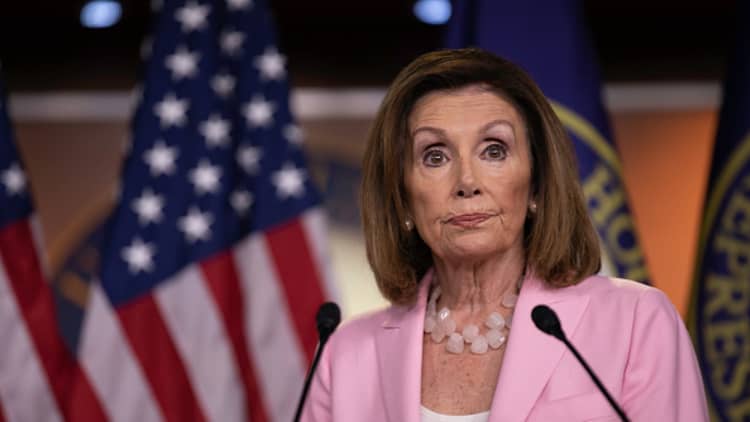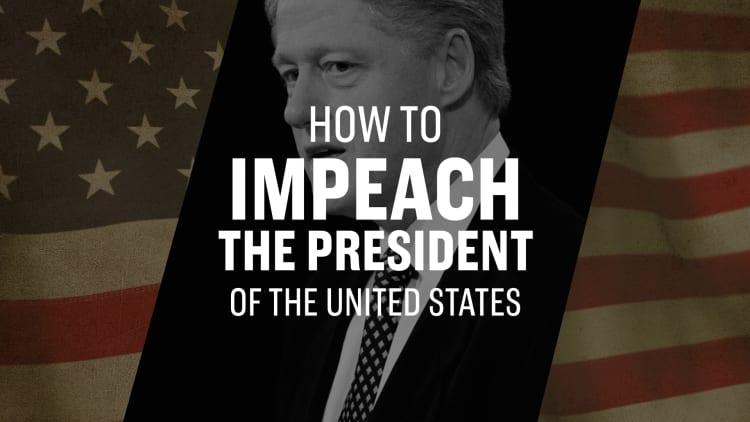Suddenly, Donald Trump has flipped political presumptions and sent House Democrats on a path toward the third presidential impeachment in American history.
And this time, Trump can't even count on the lockstep Republican support that has protected him throughout his three years in the Oval Office.
It represents an astonishing turnabout since Robert Mueller's public testimony two months ago seemed to drain energy from impeachment efforts. As Republicans found refuge in the special counsel's refusal to press charges or explicitly recommend congressional action, Speaker Nancy Pelosi signaled repeatedly that Democrats should focus on defeating Trump in 2020 elections rather than a politically risky impeachment effort.
Yet Trump's ever-bolder determination to defy constraints on presidential behavior has scrambled calculations on all sides. Day by day within the last week, his evolving public acknowledgement that he pressed a foreign power to investigate a 2020 rival has overpowered Democratic reticence.
And as a result, House Judiciary Committee member Jamie Raskin, D-Md., told a reporter, "He's going to have his constitutional reckoning."

Trump's personal lawyer Rudy Giuliani had called publicly this spring for Ukraine to investigate Joe Biden, even though no evidence has emerged of wrongdoing by the former vice president in connection with his son's business involvement there. Now, after a national security whistleblower's complaint that the White House seeks to keep secret, Trump has conceded that he urged Ukraine's leader to do so during a private phone call on July 25.
Press accounts had previously established that the Trump administration delayed military aid to Ukraine, which aims to counter aggression from Vladimir Putin's Russia. On Monday, Trump offered a justification for linking that delay to his call for a Biden-related corruption probe.
"Why would you give money to a country you think is corrupt?" the president asked.
At the United Nations on Tuesday, Trump offered a different justification. He insisted he wanted other countries to support Ukraine financially, adding: "There was never a quid pro quo."
With political pressure mounting on the White House, Trump tweeted Tuesday afternoon that he has "authorized the release Wednesday of the complete, fully declassified and unredacted transcript of my phone conversation with President Zelensky of Ukraine." He did not disclose plans to release the whistleblower complaint as Democrats have demanded to document the full confidential allegation against him.
Trump described the call as "very friendly and totally appropriate," repeating that it involved "NO quid pro quo!"
His need to offer that assertion punctuated the broadening recognition within both parties that Trump has moved the debate over his conduct to a new phase. The Trump-Russia investigation examined a past election for which the president denied "collusion" with a foreign leader to damage his opponent; his actions on Ukraine involve an upcoming election for which he publicly admits seeking a probe into his opponent.
Seven first-term Democrats with national security experience — the kinds of members Pelosi had sought to shield from an impeachment vote — dramatized the shift by publishing on op-ed in The Washington Post declaring that it's time for impeachment hearings.
"The dam has pretty much burst," observed Geoff Garin, a top strategist for Democratic leaders. "The fact that Trump essentially has confirmed that he did what he was alleged to have done made a big difference."

Once skeptical that impeachment made political sense, Garin says Democrats now have "a much clearer narrative about Trump's abuse of power." Instead of fearing loss of their House majority, Democrats now see the possibility that forcing a Senate impeachment trial may help them recapture that chamber by squeezing vulnerable incumbents like Susan Collins of Maine, Martha McSally of Arizona, Thom Tillis of North Carolina and Cory Gardner of Colorado.
"Senate Republicans will find it uncomfortable to condone or excuse his behavior," Garin said.
Already, Sen. Mitt Romney of Utah, the 2012 Republican presidential nominee, declared it "troubling in the extreme" if Trump pressured Ukraine to investigate Biden. One top GOP strategist said a documented link between that pressure and the aid delay could spur further Senate Republican defections.
"It depends on whether he blackmailed Ukraine," said former Rep. Tom Davis, who once chaired the House GOP's campaign arm. "If he did, he's in trouble."
More concrete determinations await release of the whistleblower complaint and transcript of Trump's phone call to Ukraine President Vlodoymyr Zelensky — either to Congress, or the public, or both. But as House Democrats move ahead, the refusal of key Republicans to defend the president's conduct cannot reassure the White House.
"I don't have any comment on this unless or until we see a transcript," veteran GOP Rep. Tom Cole of Oklahoma said. "It is simply too soon to make definitive statements or to speculate about possible outcomes."


